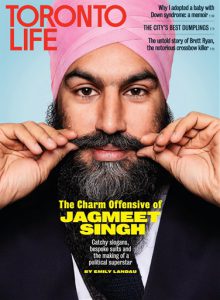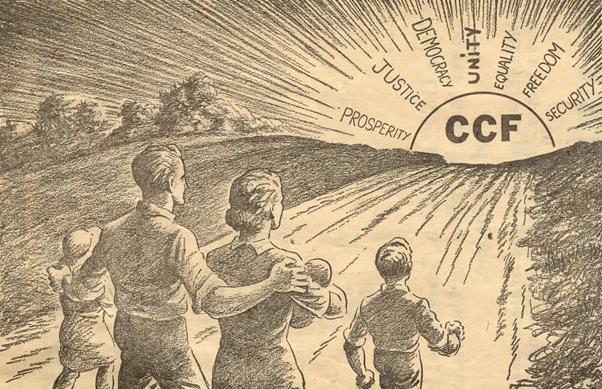Canada
The Political Excommunication of Erin Weir Betrays the Face of Modern Political Cowardice
Under the Canadian political system, party leaders are free to unilaterally block candidates, no matter the views of voters or the rank-and-file.

Erin Weir is not well-known outside of Canada. Even many Canadian readers won’t recognize the politician’s name. But the story of how he was smeared and excommunicated by his own political party presents a stunning indictment of political cowardice in the age of #MeToo. And what happened to him could happen to virtually anyone who runs for office.
Weir is a federal Member of Parliament (MP), having been elected in 2015 to represent the Saskatchewan riding of Regina-Lewvan. He ran in that election as a candidate for the New Democratic Party (NDP), which sits to the political left of Justin Trudeau’s governing Liberals, and constitutes the third-largest party in the Canadian parliament. His downfall began on January 30, 2018, the day he announced his candidacy for NDP caucus chair by sending an email to other NDP MPs, and to the leader of the federal NDP, Jagmeet Singh (who, at the time, had not yet become a Member of Parliament). The email set off a chain of events that eventually led to his expulsion from the NDP caucus, and stripped him of the opportunity to stand as a candidate for the party in the upcoming Fall, 2019, federal election. Under the Canadian political system, party leaders are free to unilaterally block candidates, no matter the views of voters or the rank-and-file. Without party affiliation, Weir’s political career is effectively over.
Weir’s undoing was the work of Christine Moore, an NDP MP for the Quebec riding of Abitibi-Temiscamingue. In a reply-all email responding to Weir’s expressed interest in becoming caucus chair, she wrote that she could never support him because “there are too many women (mostly employee[s]) who complained to me that you were harassing to them.” She then added: “As a woman, I would not feel comfortable to meet with you alone.”
Like Weir, Moore was not well-known—except insofar as she already had helped ruin the career of two MPs in Justin Trudeau’s Liberal party after advancing claims that they, too, were sexual harassers (a subject discussed in more detail below). And her new accusation would have come as a surprise (and still does) to anyone who knows Weir, a 37-year-old economist who once worked for the Canadian section of the United Steelworkers union.

Before entering federal politics, Weir had been a candidate in the 2013 leadership election held by Saskatchewan’s provincial NDP. (In Canada, it is typical for political parties at the federal and provincial levels to share the same brands—Conservative, Liberal, NDP—despite being separate entities.) As a longtime NDP politician and supporter in Saskatchewan, I can attest that the impression one would take away from Weir would be that of an unfailingly (perhaps overly) polite, earnest, respectful and decent young man. He is highly intelligent, hard-working and honest. More than most politicians, he questions things a lot, and does not seem to be able to go along unquestioningly with all of his party’s policies. These qualities made him an excellent MP for the voters of Regina-Lewvan. His independent nature, however, could be annoying to party leaders and the loyalists who surround them.
Moore’s accusation of “harassing” seemed to refer to a 2016 incident during which he became angry when a party official attempted to prevent him from participating in a convention debate. After telling her colleagues that Weir had harassed “many” employees—a claim that was never substantiated—Moore stated, in a written statement to the media, that “it is important that [the NDP] take this kind of information seriously.” The “information” at that point consisted of Moore’s own email. Then Moore did nothing, even as this apparent terror of Parliament roamed free—just as she had done nothing from 2016 to the day in 2018 when Weir had announced his bid for caucus chair.
All of this put the NDP’s young, untested leader in a difficult position. Singh had portrayed himself as a champion of workers and safer workplaces, a staunch feminist, and a supporter of the #MeToo movement—so he presumably felt pressured to act swiftly in the face of an alleged harasser within his own party, even if Moore’s abruptly aired accusations seemed dubious.
An additional factor was that Prime Minister Trudeau, another young party leader who staked much on his credentials as an uncompromising #MeToo feminist, already had set a hardline precedent in regard to the aforementioned Liberal MPs whom Moore had accused of sexual harassment in 2014: Massimo Pacetti, who represented the Quebec riding of St. Leonard-St. Michel between 2002 and 2015, and Scott Andrews, from the Avalon electoral district in Newfoundland and Labrador (2008-2015). Both had denied the charges of sexual harassment and maintained their innocence. Trudeau, however, said that the accusers had to be given the “benefit of the doubt”—and both men were expelled from the Liberal caucus, their names smeared in the process.
In the case of Andrews, the female MP who was allegedly victimized had neither asked Moore to intervene on her behalf, nor authorized her to make a complaint of harassment. In the case of Pacetti, the allegedly victimized woman was none other than Moore herself. She apparently had agreed to spend the night with Pacetti in his hotel room. Upon arrival, as Moore herself described the liaison, she gave Pacetti a condom and then went into the bathroom. While in the bathroom, she claims, she had a flashback to an earlier time in her life when, she says, she had been sexually assaulted. This flashback apparently did not prevent her from having sex with Pacetti, but she reports that the sudden onset of anxiety rendered her psychologically inert in a way that somehow made the ensuing encounter less than consensual. On this odd basis did Moore accuse Pacetti of sexual impropriety, and on this odd basis did the Prime Minister of Canada end the career of one of his MPs.
All of this happened in 2014. Now it was 2018 and Moore was complaining about yet another MP—this one in her own party. If Singh had qualms about Moore’s claims—based on her behavior in 2014, and his knowledge of Weir’s character—he didn’t let on: Two days after Moore’s January 30 email, he addressed the national media and made it clear he was a man of action when it came to #MeToo. Singh stated there was “concern expressed by one of our members” and the party was committed to building a “safer workplace.” Weir was immediately suspended pending investigation.
Unlike Trudeau, Singh was a lawyer who presumably understood the notion of due process. But these were the early days of #MeToo, and due process was out of fashion in cases such as this. Since this time, a number of high profile false accusations have come to light—including those against Steven Galloway—and some have come to realize that the #MeToo pendulum had perhaps swung too far. But Singh’s attitude was effectively that Weir was guilty until proven innocent: “The first step is always to believe survivors. We need to believe survivors. Secondly, we need to create safe spaces for survivors or people who want to come forward to be able to come forward in a way that’s safe.”
Then the plot thickened in Spring, 2018, when Moore was a protagonist in a sexual-harassment incident yet again; but this time she was the one accused of inappropriate sexual behavior. The episode involved a witness to a parliamentary committee on which she sat—a former Canadian soldier named Glen Kirkland, who had almost died at the hands of the Taliban in 2013. Cpl. Kirkland, who is afflicted by post-traumatic stress disorder, says that he had not intended to make a complaint against Moore, but changed his mind after watching her go after Weir.

Cpl. Kirkland alleged that Moore had abused her position of authority by inappropriately commencing a sexual relationship with him after he gave emotional testimony before the House of Commons Defense Committee. After the hearing at which he testified adjourned, he says, Moore approached him and asked if he would come to her parliamentary office to continue the discussion. While there, he said, Moore offered alcohol. He stated that his physician advised him not to drink alcohol because it interacted negatively with the medication he was taking. He says Moore said she was a nurse, and assured him there was no problem. He claims that when he left Parliament Hill, Moore followed him to his hotel and that, while it was not his intention to spend the night with her, he did so. Notwithstanding his attempts to indicate that he was not interested in having a relationship with her, he says, she showed up uninvited to see him at his home and, later, at a golf course in Saskatchewan.
Moore defended herself publicly, which did not seem to evoke the ire of Singh—even though Weir’s own protestations of innocence would be cited as proof that, since he lacked remorse, he could not be politically rehabilitated. Singh’s office announced that Moore would be suspended from her Parliamentary duties pending the results of an investigation. The results of that investigation, which speedily cleared Moore of wrongdoing, were never released. And Moore remains an NDP MP to this day.
As for Weir, he was being shamed in the national media with headlines such as “Investigation finds multiple complaints of harassment against NDP’s Weir: sources.” But that article, like others sourced to NDP insiders, reported on only one specific incident—the same one that already was known: “Weir spoke to [a complainant] in an angry and belligerent way and that she felt physically intimidated.” The party-ordered investigation by University of Ottawa law professor Michelle Flaherty was never made public, but its existence has been used by the NDP to justify Weir’s expulsion from the party. Singh claims that the investigator had found, in addition to the claim of belligerent behavior in the run-up to the 2016 debate, three “acts of a sexual nature that might reasonably be expected to cause offence.”
Singh’s federal NDP caucus fell in line. But the larger community of NDP members in Saskatchewan did not—in part because, as discussed below, the claim of “acts of a sexual nature” seems to have been wholly invented. Rather, Weir appears to be a socially awkward person who is what is sometimes described as a “close talker.” People found this annoying. There was no sexual dimension to this behavior.
In response to all this, I wrote an opinion denouncing Singh’s decision as “cavalier” and an “arbitrary exercise of power.” And I joined a group of 67 other former NDP MPs and provincial equivalents who wrote an open letter in which we criticized Singh as follows:
You expelled Weir from the federal NDP caucus because ‘In his actions, in his comments, Weir made it clear he did not accept responsibility for what the inquiry found to be a fact. He, in addition, attacked someone who had come forward with a complaint. He’d also released details, which could identify the individual. All of this makes it clear that a rehabilitative approach is no longer possible.’ You said Weir failed to read nonverbal cues in social settings, resulting in ‘significant negative impact to the complainants.’ Though, once told his advances were unwanted, you said Weir stopped. Weir indicated that he had spoken to you prior to the complainant going public and his expulsion from the federal NDP caucus. He acknowledged that he had difficulty picking up social cues and was willing to take training and be rehabilitated. He continued to dispute the interaction with the former federal Leader’s staff member at the 2016 Saskatchewan NDP convention. Your office has a draft letter of apology sent by Weir on April 21, 2018. Weir has stated there were no allegations of comments that were sexual in nature; rather they were allegations about Weir’s physical proximity and engagement in conversations with others for longer than the other person wanted. Weir has publicly apologized to three of the complainants, ‘I apologize to anyone who felt uncomfortable because I stood or sat too close or spoke with them more than they wished to talk with me’…A third-party investigator was appointed based on hearsay in an email from an MP. There was no official complaint that had been put in writing before an investigator was appointed. A member of your staff sent out an email to hundreds of staff suggesting concerns about Weir should be forwarded to the investigator. If you ask enough people about anyone, you are bound to find people who have something to say. You don’t appoint an investigator without an official complaint, and you don’t send out an invitation to anyone to put forward his or her complaint. There was an inherent bias in the process. This was a fishing expedition and the statement to the effect that anyone who complains is to be believed demonstrates this bias.
Singh’s response to the letter was to play victim: He went on national television and said that the 68 formerly elected Saskatchewan NDP politicians were “persons in positions of privilege” trying to “intimidate” him. Amazingly, a federal party leader who wants to be elected prime minister of a G7 nation next month was acting as if he were a student or lowly worker being bullied by his teacher or boss.

What could 68 people with 542 years of combined legislative service in government and opposition possibly know that a 30-something federal greenhorn with six years as a provincial politician under his belt didn’t already know? Had they not read the gushing cover story on Toronto Life magazine that glowingly described his amazing charisma, $2,000 suits, Rolex watches, designer bikes and million-dollar house purchased by his parents? Who else is better positioned to strike back at the forces of “privilege”? Unlike Singh, we “privileged” signatories did not all have the benefit of attending Detroit County Day School—“whose alumni include Robin Williams and former Microsoft CEO Steve Ballmer,” Toronto Life informs us, and where annual tuition currently sits north of US$30,000 per year.
I later found out that in response to the NDP leadership’s fishing-expedition email to 220 women, asking if they had concerns about Weir’s conduct, a total of 15 concerns were raised. Eleven were found not to be valid. Given the insubstantial nature of the four complaints that were accepted, it is hard to imagine how laughably trivial these 11 rejects must have been. But such was the desire to publicly shame and banish this loyal NDP foot soldier that they were duly scrutinized as part of this star-chamber process
Singh and the NDP have refused to reveal the details of what it was that Weir did to justify the destruction of his political career. Like other concerned parties, I had to find out the truth through back channels. Singh claims this secrecy is necessary to protect the complainants. Such enforced anonymization may be appropriate in cases involving real sexual assault or serious harassment. But the claims against Weir don’t fall into that category. This was just a pretext to hide the fact that the NDP didn’t really have anything on Weir. Rather, Singh saw no face-saving way to acknowledge Weir’s innocence without compromising his #MeToo credentials.
Concerning the original finding of “harassment,” let’s assume that Weir really did inappropriately lose his temper and behave rudely back in 2016. If this sort of behavior were enough to get someone thrown out of office, how many politicians would also be guilty of harassment and banished? Based on my experience in politics, I would say that a better question would be: How many would be left in office?
The answer: Very few. Certainly, I wouldn’t have lasted 16 years in a provincial legislature, in which capacity, I believe, I did a reasonable job on behalf of my constituents; notwithstanding that, like all human beings, I, on occasion, lost my temper and may have, according to today’s standards, behaved inappropriately. This confession will presumably disqualify me from being a federal NDP candidate under Jagmeet Singh. I’m very much prepared to accept that result.

As for the claims that Weir was a “close talker,” when did we decide to excommunicate members of society for behavioral tics lampooned on Seinfeld? Let us remember that Trudeau, notwithstanding his much-trumpeted feminist bona fides, lost his temper on the floor of Parliament in 2016, in plain view of hundreds of witnesses, and roughly elbowed a female NDP MP out of his way as he sought to upbraid an opposition member about Parliamentary process. The behavior was so scandalous that the press even gave it a name—Elbowgate. The victim went in front of the cameras and played it for sympathy. But Trudeau properly apologized and everyone properly moved on. That’s what happens when we are granted second chances by people of good will, as we often are in the normal course of our lives as friends, colleagues and family members.
The larger problem that the Weir case illustrates is the manner by which the political imperative to deal harshly with claims of sexual impropriety is being prosecuted through secret proceedings with no rules, no set process or transparency, no release of findings (even where there is no compelling countervailing reason), and no right of appeal. In other words: no accountability. In the Weir case, all of this transpired within a political party that seeks to oversee a Canadian democratic society governed by the rule of law. How can Singh be trusted with that task if he behaves this way with his own colleagues?

As is known to NDP insiders, Singh and Weir actually met in 2018, accompanied by former Saskatchewan NDP provincial cabinet minister Patricia Atkinson (who sent out the aforementioned open letter). In that meeting, Singh set out a list of hoops that Weir had to jump through in order to be considered for readmittance to the NDP caucus (which had remained, then and now, somewhat bewilderingly, Weir’s fervent hope). Singh demanded that Weir apologize to several MPs who were upset about something he had supposedly done, apologize to other people connected to the alleged harassment, and, most importantly, that he attend sessions with a “trainer“ approved by Singh who would counsel Weir on how to correct his behavior.
Weir agreed to all of Singh’s demands and did what he was asked to do. I have learned that the training consultant approved by Singh later reported that, in her view, Weir was a nice young man who had been unaware that some of his habits and social interactions were awkward and could make people uncomfortable. She said she had worked with him and, in her words, “he gets it.”
This should have allowed Singh to gracefully pivot to a common-sense approach, and re-admit Weir. Instead, he doubled down, and declared that he couldn’t be sure Weir wouldn’t do it again (whatever it was). Which is why, to this day, Weir remains expelled from the NDP caucus, and is unable to run for the party in the upcoming federal election this Fall, even if his constituents wish him to do so (which, as I understand, they do).
In purely human terms, the treatment of Erin Weir has been unspeakably cruel. Major religions and socially conscious political movements all are founded on the belief that we should treat others as we would want to be treated. Surely, Singh and the NDP MPs who have lined up to mumble their support for their leader’s position would not want to be treated in this manner. No one would.
But these chickens have a habit of coming home to roost. As Singh and his loyalists were throwing Weir under the bus, former NDP member Jim Manly ran as the Green Party candidate in a by-election held in the British Columbia riding of Nanaimo-Ladysmith, until recently thought to be an NDP stronghold. The NDP had pushed Manly out because of his views on the Middle East, but the voters of Nanaimo-Ladysmith apparently took a different view, and elected Manly. The NDP came third in a seat they’d once been expected to hold easily. And the latest polls suggest that the NDP is set to see its Parliamentary caucus of 39 MPs reduced to fewer than half that number. Indeed, the NDP is only three percentage points ahead of the Greens, who have only two seats. Canadian voters want to elect politicians who speak their mind, not yes-men and yes-women who do their leaders’ bidding even when it means stabbing a colleague in the back for the sake of #MeToo optics.

The precursor to the NDP was formed in the early 1930s under the banner “Humanity First.” While the party has never achieved power at the federal level, it has achieved greatness at times when it acted courageously and with conscience. This included opposition to the internment of Canadians of Japanese origin during the Second World War. The NDP opposed British Columbia’s denial of the right of people of Asian origin to vote. It opposed the denial of civil liberties under the War Measures Act in 1970. It brought public health care to Canada by leading the way in Saskatchewan. In more recent years, it has served as a de facto think tank for progressive public policy, which it sometimes has implemented at the provincial level through elected NDP governments. Like all political movements, the NDP has achieved greatness when its leaders concentrated on big issues, not prosecuting petty vendettas.
Whether the party can continue to play a relevant role in Canadian life will depend on whether its members take stock, and demand wise and accountable leadership, fair and transparent processes, and MPs with the courage to express their views without fear of retribution.
A shorter version of this article appeared in Canada’s National Post.






